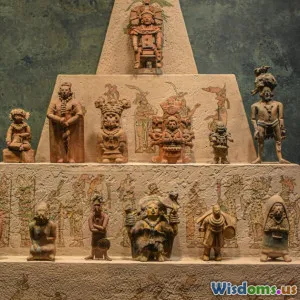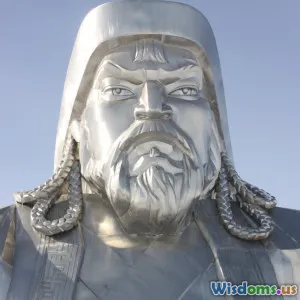What if Julius Caesar Had Survived the Ides of March
8 min read Explore the alternate history of Julius Caesar surviving the Ides of March and its impact on Rome and the world. (0 Reviews)What If Julius Caesar Had Survived the Ides of March?
The Ides of March—March 15, 44 BCE—marks one of the most infamous moments in Western history when Julius Caesar, the towering figure of Roman politics and military leadership, was brutally assassinated by a group of senators. This event not only ended Caesar's life but also punctuated the downfall of the Roman Republic and paved the way for the Roman Empire's rise under Augustus. But what if Caesar had survived that fateful day? Would Rome's story, and our own history, look dramatically different? This article explores the ripple effects of a surviving Caesar.
The Political Setting Before the Ides
By the time of his assassination, Julius Caesar was already a powerful dictator with sweeping reforms under his belt. He had centralized power, reduced debt, and expanded Roman citizenship. However, many senators saw his consolidation of authority as a threat to the Republican tradition. The phrase “Et tu, Brute?” immortalized in Shakespeare's play captures this betrayal.
The political atmosphere was tense: the Senate feared that Caesar was aiming to become a monarch – a taboo for Romans who deeply valued their republic.
Immediate Consequences: A Caesar Who Survives
Had Caesar survived the assassination attempt, there are several plausible immediate outcomes:
1. Retribution and Purge
Historical parallels suggest that Caesar would have initiated a harsher crackdown on conspirators. Unlike his actual posthumous political aftermath, which unleashed civil wars between his heirs and enemies, a surviving Caesar might have enacted swift and brutal justice. This might have led to the elimination or exile of political rivals, consolidating his dominance in Rome.
2. Further Centralization of Power
Caesar was already named dictator perpetuo (dictator for life). Surviving the plot could have emboldened him to strengthen his grip further, potentially transitioning Rome explicitly into a monarchy under his rule. Roman institutions might have shifted more swiftly away from republican checks and balances.
3. Abolition of the Senate’s Traditional Power
Caesar’s survival could have accelerated reforms reducing the Senate to a largely ceremonial body, similar to the later Roman emperors.
Long-term Political and Social Effects
The Fate of the Roman Republic
Had Caesar survived and stayed in power, the traditional Roman Republic would effectively end in a more overt fashion. While this began before his assassination, Caesar’s survival could have formalized the end of the Republic decades earlier. Critics such as Cicero might have fled into obscurity or exile.
Potential Reforms and Stability
Caesar had ambitious plans, including colonizing Gaul with veterans, reforming debt laws, and launching public works. His survival might have stabilized Rome temporarily, bringing an end to the chronic civil unrest that had plagued the late Republic.
Could Caesar Have Established a Dynasty?
In reality, Caesar was assassinated before having the chance to fully create a family legacy. Surviving, he could have positioned his adopted heir Octavian (later Augustus) or other relatives in more secure roles, possibly establishing a robust dynasty without the power vacuum that followed his death.
A dynastic Caesar might have promoted a system blending autocracy with republican forms—potentially delaying the crises that would later plague the Roman Empire.
Impact on Rome’s Expansion and the Mediterranean World
Military Campaigns
Caesar’s ambitions stretched beyond Italy and Gaul. Surviving the assassination might have meant new military ventures —conquering Parthia or extending Roman influence further into the East, altering the geopolitical landscape of the ancient world.
Administrative Reforms
His vision for Rome included restructuring provinces for efficiency and fairness. Surviving Caesar may have introduced reforms minimizing corruption more successfully, influencing governance models in vast empires thereafter.
Cultural and Economic Shifts
Caesar was a patron of arts and reforms. The peace and prosperity under his regime could have fostered a Roman Renaissance—higher literacy, engineering advances, and architectural achievements.
Global and Historical Implications
No Immediate Rise of Augustus
A direct consequence of Caesar’s death was Octavian’s rise to become the first emperor Augustus, establishing the widely documented Roman Empire. If Caesar had survived, this transition may have been postponed or altered— with potentially different outcomes for how emperorship evolved.
Influence on Western Civilization
The Roman Empire shaped law, governance, architecture, and language. If Caesar had established a longer personal rule, Roman adaptations like legal principles or citizenship rights might have been codified differently, impacting the evolution of modern Western political systems.
Preservation of Republican Values
Alternatively, had Caesar opted for reforms balancing autocracy with Republican ideals—unlikely but conceivable—the Roman political culture might have merged monarchy with democracy, providing an earlier blueprint for constitutional governance.
Counterfactual Complexities: Limits of Caesar’s Rule
Despite these possibilities, it’s important to remain grounded in realism. Caesar’s ambition and reforms engendered widespread opposition. Surviving the Ides of March would not guarantee a peaceful Rome:
- Political enemies were entrenched and powerful.
- Military struggles continued; loyalty was divided among generals.
- Economic inequality persisted.
Many historians argue the assassination was the symptom, not the cause, of a Republic in deep crisis.
Conclusion: The Enduring Legacy of One Moment
Julius Caesar’s assassination reshaped history, but imagining his survival reveals how fragile and contingent historical processes can be. His survival could have ensured a swift consolidation of autocratic power, an altered Roman Empire timeline, or even a very different Western civilization. Yet, internal conflicts and structural issues might have challenged even an unchecked Caesar.
In essence, the Ides of March stands as a pivotal point: a reminder that individual lives and choices can redirect the course of history, but broader forces often contour those choices. Reflecting on what might have been encourages us to appreciate the complexity of history, and the powerful interplay between leadership, institutions, and societal change.
As one historian noted, "History is a fable agreed upon"—and sometimes, alternative tales like Caesar’s survival become valuable lenses to understand our shared past with greater depth and nuance.
Rate the Post
User Reviews
Popular Posts



















